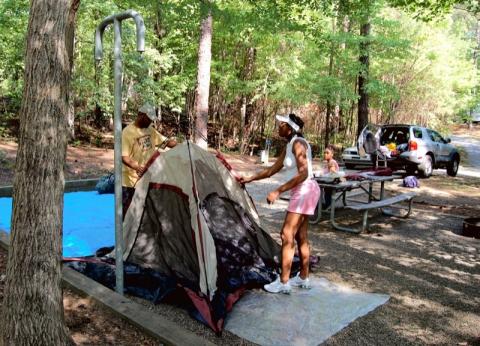
Local chapters are uniquely positioned to understand the needs and goals of the sites they support. Volunteers and active chapter members understand the needs of the site and the importance of enhancing the site’s offerings. Understanding the basics of working with site staff can help core chapter members and leaders accomplish shared goals more efficiently.
Site Manager
Ultimately, the site manager has the final authority over activities that take place at the site. It is the site manager’s responsibility to ensure the site is operated safely and in accordance with guidelines from the DNR and PRHSD and he or she will work through the appropriate Division leadership as needed. A site manager has responsibilities beyond just providing memorable experiences to park guests. Conservation and protection of the natural, cultural and historical resources may take priority in some cases over the guest experience or the chapter’s desires. Understanding these priorities can help a chapter work well with the site manager and keep things operating smoothly.
Division management, through the Site Manager has the ultimate and final authority over activities that take place on site. His or her approval must be obtained for chapter activities taking place on site.
The site manager should be an integral part of a Friends chapter. The manager’s goals and approvals are critical to helping the chapter succeed in its efforts to support the site. The site manager has a unique view of the site from the broad perspective encompassing all of the site’s needs and resources. The site manager or designee should be invited to chapter meetings to help guide the chapter toward effective support of the site.
Interpretive Staff
The interpretive staff at a site is made up of the person or people responsible for helping the public get the most out of the resources. At a historic site, the interpretive staff is familiar with the site’s history and its significance to Georgians. At state parks, the interpretive staff often has responsibility for educating the public about the resource itself and other concepts around general conservation and the natural sciences. Since the interpretive staff is typically responsible for interacting with the public, they are often the key liaison to the Friends chapter. The interpretive staff also frequently coordinates the volunteers on the site and may be the designated Volunteer Coordinator.
Volunteer Coordination
Coordinating volunteers for and with the site staff can be a critical role for the chapter. Chapters frequently help conduct special events requiring volunteer help beyond the core group of chapter leaders and active members. It is critical that the responsibility for coordinating volunteers for each event be clearly defined well in advance of the event itself. Events and projects that hinge on volunteer efforts can fail due to simple misunderstandings about who was coordinating with volunteers. For larger, more active chapters, it may be wise to designate one person within the chapter to serve as a Volunteer Coordinator. Anyone can serve in this role. The Volunteer Coordinator should coordinate with the site regarding the number of volunteers required for events and projects and clarify responsibilities for contacting and coordinating the volunteers.
